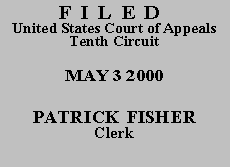

| JOHN WOODWARD,
as Administrator of the Estate of
Heather Rose Rich, deceased,
Plaintiff-Appellant, v. CAROLYN BEAVER, individually; BEAVER LUMBER & PLUMBING INC., an Oklahoma corporation, Defendants-Appellees. |
|
On October 3, 1996, Heather Rose Rich was kidnapped and murdered. Joshua Bagwell, Curtis Gambill, and Randy Wood were convicted of the murder and are currently serving life sentences. Defendant Carolyn Beaver is the Vice-President of defendant Beaver Lumber, and on October 1, 1996, she delivered shotgun ammunition to Bagwell and Gambill. She sold the ammunition on account to Bagwell's grandparents after Bagwell's mother had given Carolyn Beaver permission to deliver ammunition to Bagwell, who was a minor. Plaintiff, Heather Rich's father and the administrator of her estate, brought this diversity action for wrongful death, alleging that Carolyn Beaver negligently delivered and/or sold the ammunition to Bagwell and/or Gambill and that Beaver's negligence was the proximate cause of Heather Rich's death.
On May 13, 1999, the district court denied plaintiff's motion for partial summary judgment, which sought a ruling as a matter of law that Beaver violated an Oklahoma statute making it unlawful to sell certain arms or weapons to a minor. In denying the motion, the district court found that the shotgun ammunition Beaver delivered to Bagwell and Gambill was not an "offensive weapon" within the meaning of Okla. Stat. tit. 21, § 1272. Consequently, the district court found that Beaver did not violate Okla. Stat. tit. 21, § 1273, which makes it unlawful to sell or give a minor a weapon designated in § 1272. That ruling foreclosed plaintiff's strict liability argument. On May 21, 1999, the district court granted defendants' summary judgment motion. The court found that there was no genuine issue as to any material fact that Beaver's delivery of the ammunition to Bagwell and Gambill was not the proximate cause of Heather Rich's death. In reaching that conclusion, the district court found, as a matter of law, that there was no evidence that Beaver should have foreseen that Bagwell and Gambill would use the ammunition to murder Heather Rich and that the criminal act of murder was the supervening cause of Heather Rich's death.
We review the district court's grant or denial of summary judgment de novo to determine if there is a genuine issue as to any material fact and whether defendants are entitled to judgment as a matter of law. See Mann v. United States, 204 F.3d 1012, 1015 (10th Cir. 2000). In making this determination, we view the evidence in the light most favorable to plaintiff and draw any inferences in his favor. See id. Because our jurisdiction is based on diversity, we apply Oklahoma law to the substantive issues raised on appeal. See Boyd Rosene & Assocs., Inc., 174 F.3d 1115, 1118 (10th Cir. 1999). This case solely involves questions of Oklahoma state law.
We agree with the district court that the ammunition delivered by Beaver to Bagwell is not an offensive weapon within the meaning of Okla. Stat. tit. 21, § 1273. The district court's analysis on this point is thorough and well-reasoned, and any analysis we could make would be redundant. Therefore, we affirm the district court's denial of plaintiff's motion for partial summary judgment on the statutory question for substantially the same reasons stated in the district court's order dated May 13, 1999.
We also agree with the district court's ruling as a matter of law on the Oklahoma state law issue of negligence. Again, the district court's opinion on this issue is thorough and well-reasoned, and we affirm the grant of summary judgment in favor of defendants on the state law negligence issue for substantially the reasons stated by the district court in its order dated May 21, 1999.
AFFIRMED.
Entered for the Court
Circuit Judge
*. This order and judgment is not binding precedent, except under the doctrines of law of the case, res judicata, and collateral estoppel. The court generally disfavors the citation of orders and judgments; nevertheless, an order and judgment may be cited under the terms and conditions of 10th Cir. R. 36.3.